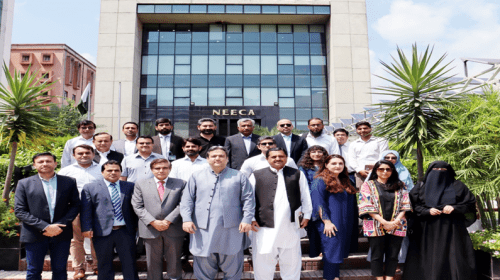August 28, 2025 (Islamabad, Pakistan) — The National Energy Efficiency and Conservation Authority (NEECA) convened a high-level roundtable to address the urgent need for energy efficiency in agriculture, particularly as recurrent flooding threatens both farmer livelihoods and national food security. The session gathered a diverse audience from federal and provincial government agencies, development sector organizations, research institutions, and the private sector. Among those who attended were Alam Zeb Khan, Additional Secretary, Ministry of National Food Security & Research, and other representatives from provincial departments from Khyber Pakhtunkhwa and Sindh, the Food and Agriculture Organization (FAO), the International Water Management Institute (IWMI), GIZ, and several agri-technology firms and private sector consultants.
Opening the dialogue, NEECA’s Managing Director, Dr. Sardar Mohazzam, underscored the urgency of reform. He observed that the floods of recent years have exposed deep structural vulnerabilities in Pakistan’s agricultural backbone, noting: “Reproducing existing inefficiencies in our agricultural systems is untenable. Investments in efficient tube wells, solar pumps, and low-energy cold storage are simultaneously pathways to economic productivity and critical pillars of climate resilience.”
Discussions highlighted the heavy reliance on diesel and electricity for irrigation, outdated machinery, and unsustainable water use, all of which contribute to higher cultivation costs and environmental degradation. Participants stressed that future interventions must be firmly data-driven, supported by comprehensive studies and reporting mechanisms that can guide both technology choices and financing models. Solutions explored included solar-powered tube wells, energy-efficient pumps, tractor tune-ups, modernized farm machinery, and improved operation and maintenance practices, with the recognition that existing infrastructure and past programs should be assessed and leveraged rather than overlooked in designing new initiatives. Financing was identified as a critical enabler, with models such as on-bill payments, vendor credit, and blended public–private partnerships seen as essential for making technologies accessible to smallholders. At the same time, participants noted that energy itself remains expensive, raising the challenge of balancing the farmer’s need for affordable production with the consumer’s interest in accessible food prices. Cold storage was recognized as another urgent priority, particularly in flood-prone areas where post-harvest losses rise sharply during energy disruptions.
The roundtable concluded with a call to establish a permanent inter-institutional forum to coordinate efforts, sustain momentum, and ensure provincial and federal ownership of reforms. Participants agreed on the need for a joint action plan to mainstream energy efficiency in agriculture, positioning it as a cornerstone of Pakistan’s strategy for climate resilience, affordability, and sustainable growth.
###
The National Energy Efficiency & Conservation Authority (NEECA), established under the NEECA Act 2016 and operating under the Ministry of Energy (Power Division), Government of Pakistan, serves as the national focal body for driving the agenda of energy efficiency and conservation (EE&C) across all sectors of the economy.







